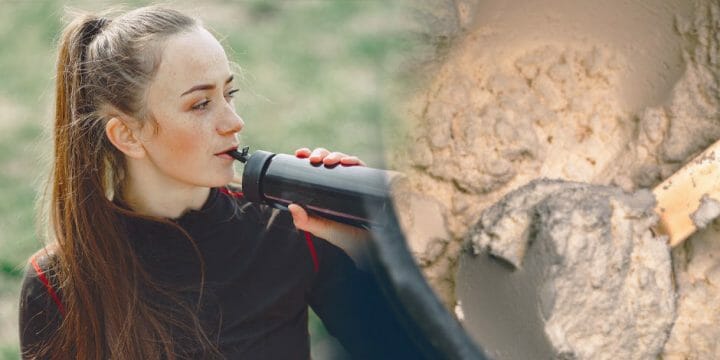As an experienced personal trainer, I've had the privilege of working with a diverse range of clients, each with their unique fitness goals and challenges. One common thread I've noticed is the confusion surrounding creatine supplementation - particularly, how much to take.
I've seen many either taking too little to reap the full benefits or too much, leading to unnecessary concerns.
This observation has inspired me to write this comprehensive guide on the ideal amount of creatine you should take daily.
Let's dive in
Quick Summary
- You should take roughly 3-5 grams of creatine per day to supply your body with the required creatine levels.
- Creatine is essential as it supplies the body's muscles with the required energy levels to perform different workout routines.
- Creatine use often leads to pure muscle mass gain of 2-4 pounds over a period of 4-12 weeks of consistent exercise as per Cleveland Clinic.
- From my experience, adhering to the recommended creatine dosage can significantly enhance workout results without any adverse effects.
Creatine Supplement Right Dosage
Taking the right dose of creatine ensures optimal results while taking too much can cause stomach issues.
As an experienced personal trainer who has guided numerous clients through their creatine supplement routines, I can confidently advise on the right dosage for taking creatine supplements.
That said, there are two phases to the supplementation: loading period and maintenance dose.
Loading Phase

I usually recommend starting with the loading phase; 20 grams per day, divided into 4 servings, for 5-7 days.
During this phase, I usually advise my clients to hydrate throughout the day since the supplement can cause water retention as it pulls water into muscle cells.
Maintenance Dose
After the loading phase is the maintenance phase. I usually recommend my clients to take 3-5 grams of creatine per day.
During workout days, you may use creatine as a pre-workout and post-workout supplement. During rest days, you still need to take it with your balanced protein and carbohydrate meal.
If you want to skip the loading phase, you may take 3 grams of creatine for 28 days to increase your creatine stores. You can find here fact-based information on how long it takes for creatine to start working.
Why Creatine Is Necessary

Creatine is a substance our body naturally produces from amino acids. It stores energy that powers muscle fibers to perform high-intensity exercise.
How Creatine Helps Muscles
Creatine aids muscles in performing high-intensity exercises by helping to produce more ATP, the energy currency of cells.
During explosive movements, the body's ATP supply lasts only a few seconds. Creatine, converting into creatine phosphate, provides a high-energy chemical that assists in generating more ATP.
This results in increased energy availability in muscles, enhancing their ability to perform high-intensity activities like weightlifting and sprinting.
Creatine Stored in Our Bodies
Our muscle stores 95% of the creatine in the body, and the brain, liver, and kidney stores the other 5%.
Creatine Sources and Needs
We can get creatine from high-protein foods such as red meat and seafood, but these sources provide it at much lower levels compared to creatine supplements.
This is particularly relevant for vegetarians and vegans, who might have lower baseline levels of creatine due to their dietary restrictions, making supplementation a beneficial option.
Many athletes and weightlifters I've worked with have turned to supplementing with creatine. They report experiencing bursts of speed and strength, an increase in muscle lean mass, and quicker recovery during exercises.
Safety and Side Effects

Creatine is widely used and safe, though some worry about side effects like dehydration and cramping. However, research shows creatine doesn't mess with the body's fluid balance, busting the dehydration and cramping myth.
There's also talk about its effect on kidney and liver health due to higher creatinine levels, but no studies back this up.
The International Society of Sports Nutrition actually ranks creatine as one of the safest, most effective supplements [1]. In my experience, both personal and with clients, I've seen no negative effects from creatine.
The only heads-up is for those on meds: check with your doctor before mixing creatine into your routine. For healthy folks using the right dose, creatine is safe.
Creatine Monohydrate

There are many forms of creatine supplements with the most common being creatine monohydrate.
There are at least five science-backed reasons why creatine monohydrate is the best form. Creatine monohydrate:
- Is the safest form to consume
- It has the highest number of scientific support
- Improves overall health and exercise performance
- Is widely available
- Has the lowest price
Studies by the International Society of Sports Nutrition as shown earlier, support that creatine monohydrate has no short-term or long-term adverse effects.
Based on the experiences of my clients, creatine monohydrate has consistently proven to be the safest and most effective form of creatine supplement, with noticeable improvements in strength and performance without adverse effects.
Related Article: Can Creatine Make You Fail a Drug Test
3 Main Uses

Creatine supplements are commonly used for bodybuilding goals but are also used in a variety of ways.
1. Improve athletic performance
“Athletes looking for a competitive edge may find creatine beneficial.”
- Autumn Bates, Certified Clinical Nutritionist &Sports Nutritionist
Not only does creatine help improve athletic performance, but it also leads to faster regeneration of ATP levels. It means that athletes recover faster after intensive exercise.
Related Article: Can Creatine Affect Drug Results?
2. Enhance Gym Experience

3. Boost Brain Health
It is not only our muscles that need the energy to function; our brains require it, too.
Creatine supplementation increases the amount of creatine in our brain to help produce more energy for cognitive function.
it also helps improve our memory and reduce mental fatigue.
4 Main Benefits

Creatine is known to provide many benefits for all fitness levels.
1. Boost Muscle Strength
A study published in the National Library of Medicine demonstrated that taking creatine resulted in an 8% increase in muscle strength compared to when not taken [2].
Having strong muscles helps you perform physical activities such as lifting weights with ease. It also helps lower the risk of injury and maintain a healthy body weight.
2. Increase Lean Muscle Mass
3. Speed Up Muscle Recovery

We experience body soreness and exhaustion when we stress our muscle fibers too much, causing them to break.
The damaged fibers then need time to recover to come back stronger. This is what makes the recovery period super important.
Using creatine shows faster muscle recovery; it helps the muscle fibers rebuild faster, making them grow stronger and bulkier.
4. Improve Performance
As a personal trainer, I've witnessed firsthand how creatine supplementation has significantly boosted my clients' performance. They've reported noticeable improvements in strength, power, and endurance.
Many have experienced enhanced lifting capabilities, increased sprinting power, and prolonged endurance during high-intensity workouts, attributing these gains to their regular use of creatine supplements.
FAQs
Can Creatine Cause Hair Loss?
There is no sufficient evidence to show that creatine causes hair loss. However, some show it can increase levels of DHT, a chemical that contributes to hair loss. It is recommended to seek medical advice before taking the supplement if you are susceptible to hair loss.
When Should I Take Creatine?
When you should take creatine depends on your goals. If you want to boost your training performance, then take it 30 minutes before your workout session. But if you want to boost your muscle recovery, take it after. Research found that you might reap maximum results when you take it not long before and after a workout.
Does Creatine Affect You Mentally?
Yes, creatine positively affects you mentally by boosting your cognitive function. There is not enough evidence that it causes anxiety or depression. However, it is important for those taking medications for mental illnesses to consult their doctors before taking creatine supplements.
Does Creatine Cause Weight Gain?
Creatine may cause weight gain because it increases your lean tissue, but it does not cause gain in stored fat. Instead, it helps you lose weight from stored fat, and it also helps you burn more calories keeping the risk of obesity at bay.
References:
- https://jissn.biomedcentral.com/articles/10.1186/s12970-017-0173-z
- https://pubmed.ncbi.nlm.nih.gov/14636102/
- https://my.clevelandclinic.org/health/treatments/17674-creatine
- https://www.ncbi.nlm.nih.gov/pmc/articles/PMC7739317/
About The Author
You May Also Like






